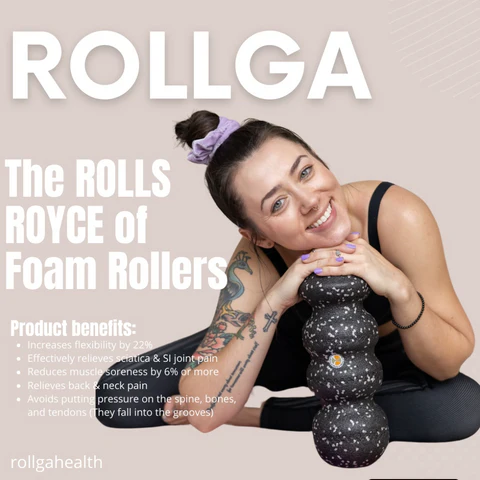
Foam rolling has exploded in popularity in recent years, and for good reason. This simple self-care technique offers a wealth of benefits for athletes and fitness enthusiasts of all levels. By applying pressure to your muscles and fascia (the connective tissue that surrounds them), foam rolling can:
- Improve muscle recovery: Exercise creates microscopic tears in muscle fibers. Foam rolling helps increase blood flow, which delivers oxygen and nutrients to repair these tears and reduce post-workout soreness.
- Enhance flexibility: Tight muscles can limit your range of motion. Foam rolling helps break down tightness and adhesions in the fascia, allowing your muscles to move through a wider range.
- Boost performance: Improved flexibility and reduced muscle soreness can lead to better performance in your workouts.
- Reduce pain: Foam rolling can help target trigger points, those hypersensitive areas in your muscles that can cause pain.
However, for beginners, the world of foam rolling can be a little intimidating. Traditional foam rollers can be uncomfortable and difficult to use on certain areas of the body. That's where the Rollga comes in.
The Rollga Difference: Designed for Beginner Success

The Rollga is a revolutionary foam roller unlike any other. Its unique, contoured design features:
- Grooves: These channels cradle your spine and other bony areas, preventing pressure and discomfort while allowing you to target surrounding muscles more effectively.
- Multi-density foam: The Rollga's comes in three densities to provide a customized rolling experience. Beginners can use the softest Rollga, while more experienced rollers can utilize the standard and pro models for deeper tissue work.
- Pointed end: The targeted tip of the Rollga Point allows you to zero in on specific trigger points and tight areas for a more precise release.
- Lightweight and portable: Take your Rollga with you to the gym, on vacation, or anywhere you need to roll out the tension.
Getting Started with Your Rollga: A Beginner's Guide

Here's what you need to know to get started with your Rollga and unlock the amazing benefits of foam rolling:
Before You Roll:
- Warm up: Foam rolling is most effective on warm muscles. Do some light cardio or dynamic stretches for 5-10 minutes to get your blood flowing.
- Hydrate: Staying hydrated helps your muscles recover and makes foam rolling more comfortable.
- Listen to your body: Foam rolling should cause some discomfort, but not pain. If you experience sharp pain, ease off or stop completely.
Rollga Rolling:
Here are some basic Rollga exercises to target major muscle groups:
1. Calves:
- Sit on the floor with your legs extended.
- Place the Rollga under your calves, with the grooves on either side of your Achilles tendons.
- Roll back and forth slowly, applying gentle pressure.
- Hold for a few seconds on any particularly tight spots.
- Repeat 5-10 times per calf.
2. Hamstrings:
- Sit on the floor with your legs extended and the Rollga under your hamstrings.
- Lean back slightly and use your arms for support.
- Roll back and forth, focusing on the fleshy part of your hamstrings.
- Avoid rolling directly over your hamstrings tendon behind your knee.
- Repeat 5-10 times.
3. Glutes:
- Lie on your back with your knees bent and feet flat on the floor.
- Place the Rollga under one glute, with the groove avoiding your tailbone.
- Roll side to side, focusing on any tight spots.
- Repeat 5-10 times per glute.
4. Quads:
- Lie on your stomach with the Rollga under your quadriceps (upper thighs).
- Roll back and forth, focusing on the area between your knee and hip.
- Avoid rolling directly over your kneecap.
- Repeat 5-10 times per quad.
5. Upper Back:
- Lie on your back with the Rollga vertically beneath your upper back, with the grooves on either side of your spine.
- Lift your hips slightly off the ground and support yourself with your forearms.
- Roll up and down slowly, focusing on your upper back muscles.
- Repeat 5-10 times.
Remember: Breathe throughout your rolling sessions. Inhale as you roll out and exhale as you release pressure.
Bonus Tip: Rollga also offers instructional content on their Youtube, Instagram, and Facebook pages!
Safety and Precautions
While foam rolling is generally safe, it's important to be aware of a few precautions:
- Avoid rolling over bones or joints: The Rollga's grooves provide the perfect protection for your body!

